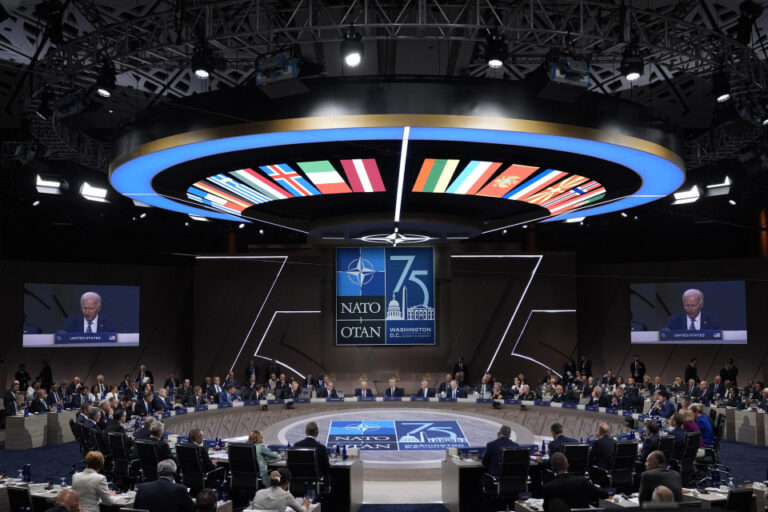NATO leaders on Wednesday accused China of “decisively encouraging” Russia’s ongoing war against Ukraine, in their harshest criticism yet of China, which NATO sees as continuing to challenge the rules-based international order.
A joint declaration approved by the leaders of NATO’s 32 member states at a summit in Washington also said they “strongly condemned” North Korea’s export of artillery shells and ballistic missiles for use in the war in Ukraine.
“The deepening strategic partnership between Russia and (China) and their mutually reinforcing attempts to undermine and reshape the rules-based international order are a cause for deep concern,” they said.

Pictured is the opening ceremony of the NATO summit in Washington on July 10, 2024. (AP/Kyodo)
The leaders used much stronger language about China than previous NATO statements and called on Beijing to end all material and political support for Russia’s war effort.
NATO Secretary General Jens Stoltenberg said at a press conference that it was the first time that all NATO member states, which account for 50 percent of the world’s economy, have expressed such concern about China.
China has sought to remain neutral in the war and has denied providing direct military aid to Russia, but Western officials have expressed alarm at the growing ties between the two countries in recent months.
They believe that Chinese transfers of dual-use materials, such as microelectronics and nitrocellulose, to Russia will revitalize China’s military-industrial base.
Stoltenberg said NATO, unlike the European Union, is not an organisation that can impose economic sanctions but stressed that NATO’s message was clear: China’s interests would be harmed if it continued to support Russia’s military industries.
The declaration, released on the second day of the three-day summit, said China, as a permanent member of the UN Security Council, has a special responsibility to uphold the principles of the UN Charter.
The leaders reiterated that China continues to pose a “systematic challenge” to Euro-Atlantic security and expressed concern about Beijing’s actions in other areas, including the rapid development of its nuclear weapons program and its “malicious” cyber activities.
China immediately hit back at NATO’s statement, slamming it as “filled with Cold War thinking and bellicose rhetoric.”
“The China-related clauses are provocative and full of obvious lies and slander. We firmly reject and deplore these accusations, and have lodged a strong protest with NATO,” China’s delegation to the European Union said in a statement.
Regarding Ukraine, NATO announced a new set of measures aimed at strengthening short- and long-term support for the war-torn country.
The proposals include providing at least 40 billion euros ($43 billion) to support Ukraine next year and stationing a civilian senior NATO representative in Kiev to facilitate communication between NATO and Ukrainian authorities.

NATO Secretary General Jens Stoltenberg speaks at a press conference in Washington on July 10, 2024. (Anadolu Agency/Getty/Kyodo News)
“Ukraine’s future lies in NATO,” the leaders said, welcoming the country’s armed forces’ increased interoperability with NATO and praising efforts to reform its political and economic systems since their last summit in Lithuania.
They vowed to support Ukraine on its “irreversible path to full Euro-Atlantic integration, including NATO membership.”
But they also said NATO would only be in a position to extend an invitation to Ukraine to join if current member states “agreed and the conditions were met.”
The leaders are due to meet on Thursday with NATO’s four Indo-Pacific partners: Australia, Japan, New Zealand and South Korea.
In the document, the leaders said they would step up practical cooperation with the four countries, including through projects related to Ukraine, cyber defence, disinformation and emerging technologies.
Related article:
NATO launches four new defense projects with Indo-Pacific nations
Japanese and South Korean leaders meet to discuss North Korea issue
North Korea launches two ballistic missiles, one of which may have failed

